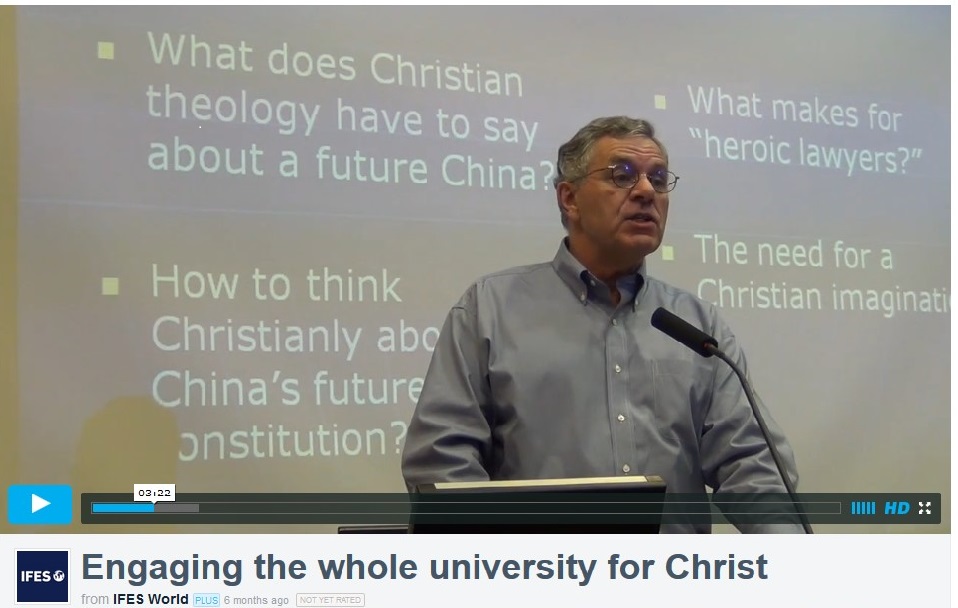
Are we going to treat the campus as a whole as our mission field?
What if Christ really, truly engaged the whole university? This is a great, bold and magnificent vision. May we be worthy of it. — Terence C. Halliday
To continue the train of thought inspired by NY Times: Colleges and Evangelicals Collide on Bias Policy and Book Review: The Global Diffusion of Evangelicalism, let’s “get back to basics” and give attention to Terence C. Halliday‘s Engaging the whole university for Christ. As you may know, Terence is a specialist in globalization and law. The below presentation was given at a regional International Fellowship of Evangelical Students (IFES) conference in Ghana and I find it inspirational with regard to our labors as part of not only InterVarsity-USA, but also the larger IFES movement.
Engaging the whole university for Christ from IFES World.
May Terence’s brief compare-and-contrast of pietistic, evangelistic, apologetic, and dialogic models of ministry followed by concrete examples of dialogic ministry from across the globe leave us with a number of important principles to press into including:
- the importance of moving from “the edge of the campus to the heartland” — building from the bottom up locally through the creativity of young people who have been given “the oxygen to breathe the energy of a movement” (Daniel Bourdanné).
- reaching faculty, students, every person on campus.
- joining in the conversation over the big ideas that alter imaginations and change the world.
- allowing the disciplines to test and refine our faith so it may become stronger and more mature.
- thinking Christianly and engaging the university, where every issue is worth consideration from the lens of faith.
As you may remember, we have previously explored the dialogic model through the work of Vinoth Ramachandra, who serves on the International Fellowship of Evangelical Students (IFES) Senior Leadership Team as Secretary for Dialogue & Social Engagement through Engaging the University (15:16) and the 2012 Henry Martyn Lectures. Below are a few questions I adapted from a brief post on Vinoth’s Engaging the University and offer for your campus consideration (individually and as part of campus ministries Engaging the the whole university for Christ):
- What does Engaging the whole university for Christ look like on the campus/campuses with which I am connected and been called to serve?
- In what manner will a dialogic ministry focus, when more fully developed on campus, lead to a missional ministry which is
- proactive
- extensive
- comprehensive
- respecting of the spiritual gifts of the students of and faculty
- relevant
- listening as well as speaking
- enjoying intellectual community?
- How can the Emerging Scholars Network assist in incarnational ministry, digging into
- communications/networking platforms
- conferencing/networking recommendations
- disciplines
- guest speakers
- mentoring
- resourcing
- writing
- taking next steps?
As I have previously shared, please do not hesitate to let me know of particular online resources which you desire to be developed further for your encouragement, equipping, academic mentoring/networking, discerning the Presence of Christ. . . .
To God be the glory!
Note (6/13/2014, 3:24 pm): How should Christians engage the university? (Ross H. McKenzie. Soli Deo Gloria. 4/25/2103) offers links to a series of short videos where Terence is interviewed by Mark Labberton, President of Fuller Seminary.
Update: 6/13/2014 (10:40 am). Minor edits.
Tom enjoys daily conversations regarding living out the Biblical Story with his wife Theresa and their four girls, around the block, at Elizabethtown Brethren in Christ Church (where he teaches adult electives and co-leads a small group), among healthcare professionals as the Northeast Regional Director for the Christian Medical & Dental Associations (CMDA), and in higher ed as a volunteer with the Emerging Scholars Network (ESN). For a number of years, the Christian Medical Society / CMDA at Penn State College of Medicine was the hub of his ministry with CMDA. Note: Tom served with InterVarsity Christian Fellowship / USA for 20+ years, including 6+ years as the Associate Director of ESN. He has written for the ESN blog from its launch in August 2008. He has studied Biology (B.S.), Higher Education (M.A.), Spiritual Direction (Certificate), Spiritual Formation (M.A.R.), Ministry to Emerging Generations (D.Min.). To God be the glory!

Leave a Reply